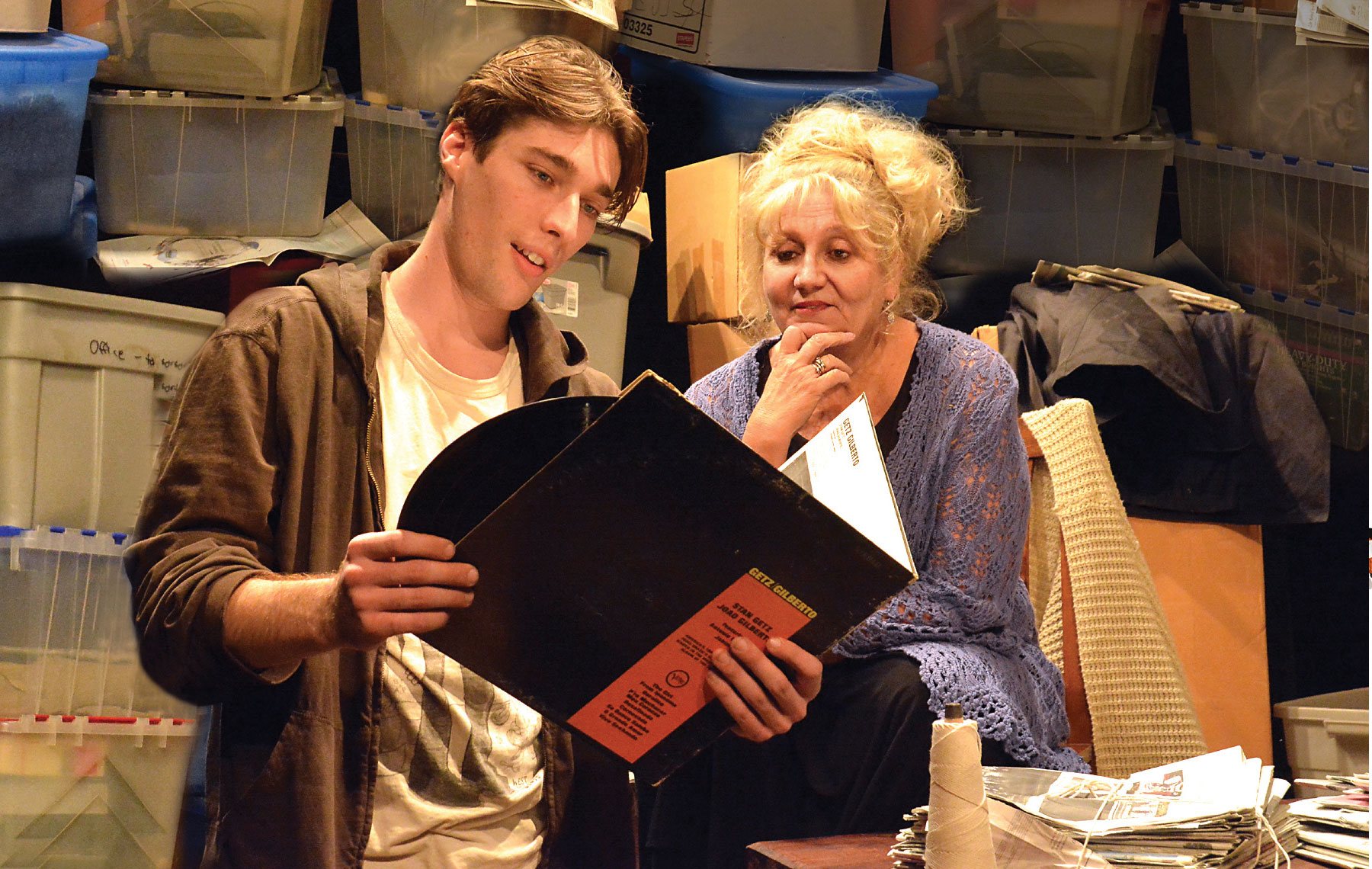 Dor Gvirtsman and Suanne Spoke in “Exit Wounds”
Photo by Ed Krieger.
Dor Gvirtsman and Suanne Spoke in “Exit Wounds”
Photo by Ed Krieger. Three generations struggle with the fallout in the aftermath of a horrific tragedy in Wendy Graf’s play “Exit Wounds,” which has its world premiere Nov. 16 at The Grove Theater Center in Burbank.
Unable to process her overwhelming grief after her son commits a violent act, Linda Sadowski (Suanne Spoke) becomes a hoarder, cut off from the world and estranged from her other son Matt (Marshall McCabe). Matt’s alienated, troubled teenage son Danny (Dor Gvirtsman) is caught in the middle, suffering the repercussions of his father’s fear and his grandmother’s grief.
Graf said she was inspired by both a fascination with what happens to the families of those who commit terrible mass crimes and the idea that family members tend to see one another through the lens of others in the family. She also incorporated the theme of tikkun olam, including the talmudic saying, “If you save one person, you save the world” in the script.
“It’s such an inspiring message, especially in these times we’re living in,” Graf told the Journal after a rehearsal. Although the play isn’t about being Jewish, the Sadowskis are Jewish, and Graf “always writes from a Jewish standpoint,” she said.
“My first play, ‘The Book of Esther,’ was about the search for Jewish identity. ‘Lessons’ is the story of a rabbi who has given up her faith and a man who never had it who has a bar mitzvah at 70.” “Leipzig” follows a Kindertransport survivor suffering from Alzheimer’s.
“I like to end my work with questions rather than answers.” — Wendy Graf
Graf cited an old Japanese custom in which the cracks in a broken vase or dish are filled with gold “because it’s important to recognize the cracks. I thought of this [Sadowski] family as a broken plate. The cracks will always be there.” The play’s ending isn’t wrapped up neatly, but it is redemptive. “I like to end my work with questions rather than answers,” Graf said.
“Exit Wounds” is being presented in repertory with Suzanne Bradbeer’s “Confederates,” both finalists in the Moss Hart & Kitty Carlisle Hart New Play Initiative that drew 1,243 entries. Either Graf or Bradbeer will receive a six-week, off-Broadway run in March.
Tony-winning producer (“Porgy & Bess,” “Hair’), director and playwright Christopher Hart (Hart and Carlisle’s son) is directing both plays.
“We hope it will be an annual program,” he said, reminiscing about his parents and their contributions to the “golden age of the theater.” He’s writing a book about growing up with them and their friends, including his father’s agent Swifty Lazar, aka “Uncle Irving,” the subject of his play “Swifty.”
Although Hart’s parents were big supporters of Israel, they were not religious Jews. “I didn’t get religion until I ran into anti-Semitism at school,” he said. As one of two Jewish boys at a Santa Barbara boarding school, he said he was beaten and had “kike” written in his books. He went to synagogue on Friday nights “because if I was going to take s—, I was going to stand up. I wasn’t going to hide from it,” he said.
Hart hopes that “Exit Wounds” audiences “feel what these characters have gone through and ask questions about what they would do under the circumstances. It’s a situation that needs to be thought about and talked about,” he said. “I can’t imagine anyone not being moved by it.”
Dor Gvirtsman acknowledged the difficulty of playing an emotional role like Danny, but he relishes the journey. “I’m always attracted to roles where, over the course of the show, the character changes,” he said.
No stranger to playing Jewish characters, Gvirtsman played Danny Saunders in “The Chosen” earlier this year and Peter van Daan in “The Diary of Anne Frank” in high school.
“I actually wanted to be a psychologist when I was young,” Gvirtsman said. “I’ve always been curious about what makes people work.” However, his love of acting was stronger. “I realized it was my favorite part of every day.” He attended the California State Summer School for the arts after his sophomore year, went on to study at USC and received further training at Shakespeare by the Sea after graduation.
Gvirtsman, who recently shot a TV pilot for a sitcom set in a special education class, hopes to have the opportunity to work in all mediums, “like Andrew Garfield and Daniel Radcliffe are doing,” he said.
Born in Israel, the son of Sabra parents who moved to Silicon Valley when he was 4 1/2, Gvirtsman was raised in a “very Reform” home. “I never grew up going to synagogue, other than the year all my friends had bar mitzvahs,” he said. After his own bar mitzvah, he began to keep kosher. “I thought it was hypocritical to do all this preparation and not keep the connection,” he said.
He stopped keeping kosher last year. “Now, as an adult, I have more ways to interact with my faith. I do pray privately especially on Yom Kippur,” he said. “I associate Yom Kippur with a lot of themes in this play.”
The shocking acts of violence that have become commonplace today “remind me why [plays like this] must be done, why we must confront this,” Gvirtsman said. “Theater forces us to do that, to focus on the humanity of it. I think that’s incredibly valuable. Learning about other people is the best tool we have,” he said. “We have an enormous capacity for empathy if we choose to tap into it. There’s so much that we have in common and so much we can learn from each other.”
“Exit Wounds” runs Nov. 16-Dec. 16 at the Grove Theater Center in Burbank.






















 More news and opinions than at a Shabbat dinner, right in your inbox.
More news and opinions than at a Shabbat dinner, right in your inbox.